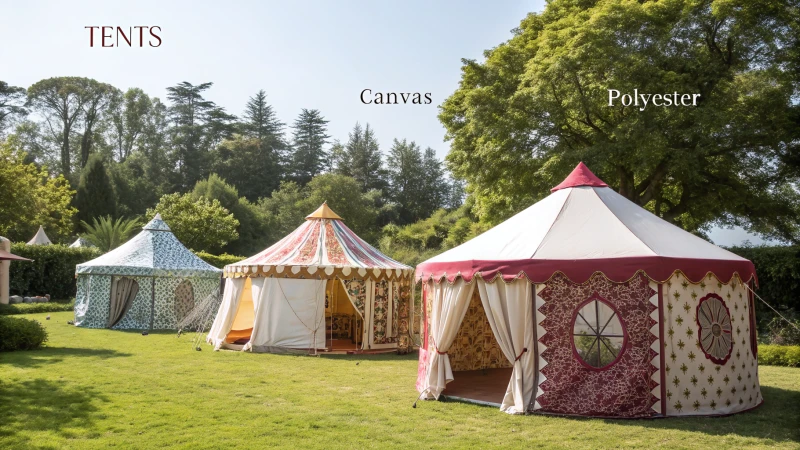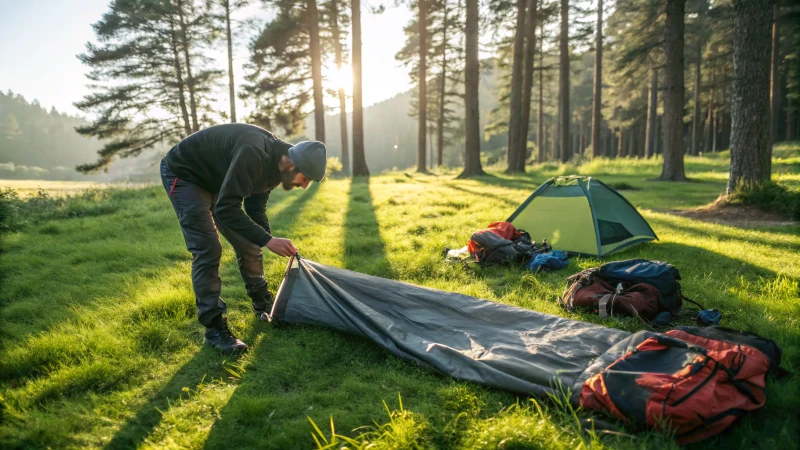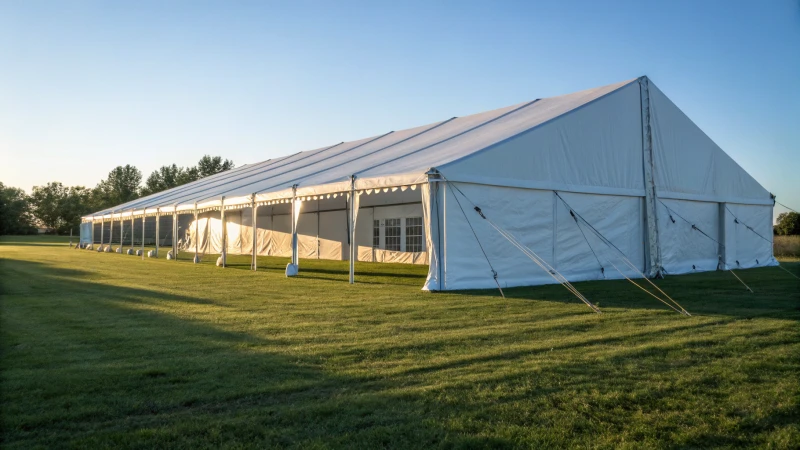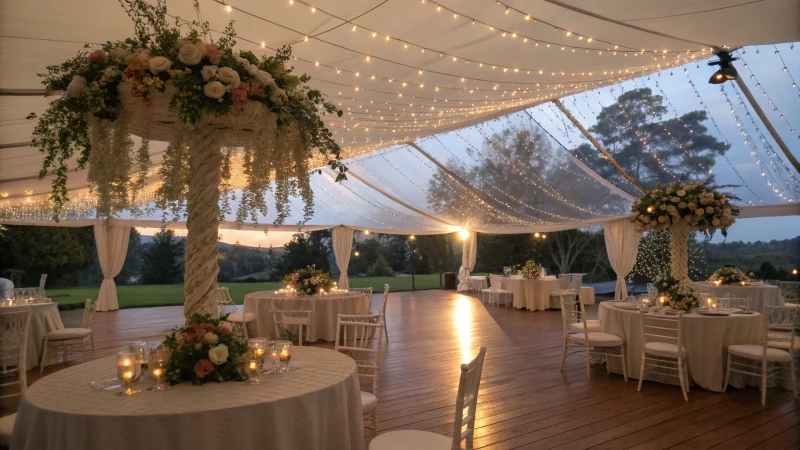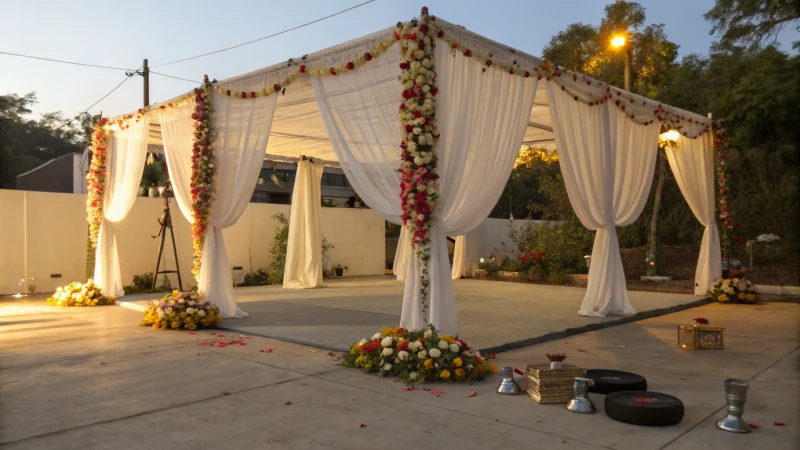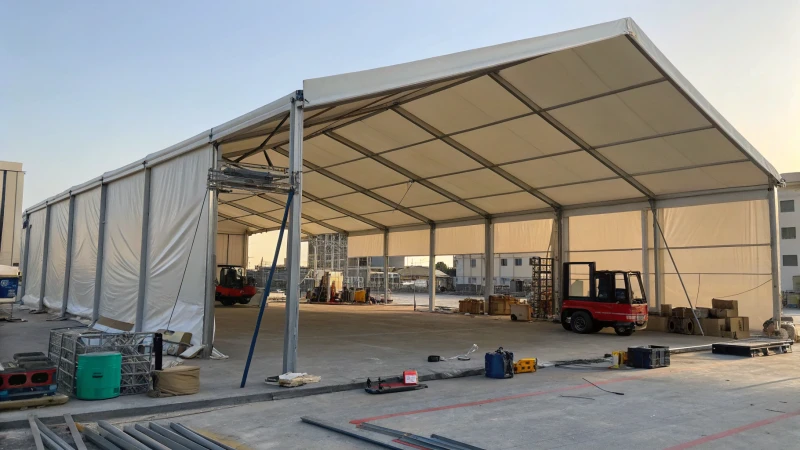
I still remember the first time I invested in an industrial tent; it was like opening a whole new world of possibilities for my business.
To extend the life of an industrial tent, it’s crucial to use high-quality materials such as aluminum frames and PVC-coated fabric, conduct regular inspections for wear and tear, and safeguard against harsh weather with proper anchoring and tensioning techniques.
These initial steps lay a solid foundation for your tent’s longevity, but there’s so much more you can do. Through trial and error, I’ve discovered a treasure trove of techniques that keep my tents sturdy and reliable. Dive into this guide to learn all the little secrets that will make your tent last for years.
High-quality materials extend tent life.True
Using durable materials like aluminum and PVC enhances longevity.
Regular inspections are unnecessary for tent maintenance.False
Frequent checks help identify and repair wear, preventing damage.
Why Do High-Quality Materials Matter for Tent Longevity?
Ever wondered why some tents seem to last forever while others barely make it through a season?
High-quality materials are the secret to a tent that stands the test of time. Using durable fabrics like PVC-coated polyester and sturdy frames such as aluminum, you can ensure your tent endures harsh weather and frequent use, ultimately extending its lifespan significantly.

The Role of Frame Materials
I remember my first camping trip vividly—the excitement, the adventure, and sadly, the tent poles snapping in the middle of the night! That’s when I learned the hard way that the frame is truly the backbone of any tent. By opting for aluminum or galvanized steel, I found a solution. Aluminum is incredibly lightweight and resistant to corrosion, making it a reliable choice for frequent movers like me. On the other hand, galvanized steel, though heavier, offers unmatched strength and durability.
| Material | Benefits |
|---|---|
| Aluminum | Lightweight, corrosion-resistant |
| Galvanized Steel | High strength, long-lasting |
Importance of Fabric Quality
If you’ve ever been caught in a downpour, you know how crucial good fabric is. PVC-coated polyester has become my go-to because it’s waterproof, UV-resistant, and flame-retardant. It’s like having an umbrella and sunscreen rolled into one! These features protect against sun damage1 and nasty mold or mildew, which can quickly wear down cheaper fabrics.
Certification Standards
One thing I’ve learned over the years is that not all tents are created equal. When selecting materials, I always look for certifications like ISO, CE, or SGS. These little badges of honor assure me that the tent can withstand environmental stresses over time.
Maintenance and Longevity
Even with top-notch materials, regular upkeep is vital. I check my tents for rust and tears after every trip—it’s like giving them a little TLC. Anti-rust treatments2 and proper cleaning solutions are lifesavers in extending a tent’s life.
Cost vs. Longevity
I’ve found that spending more upfront on high-quality materials saves me from frequent repairs later. It’s a lesson in investing wisely—paying a bit extra initially can lead to significant savings over time as my tents last longer.
Summary Table: Material Benefits
Choosing high-quality materials is like giving your tent a suit of armor against the elements. It’s an investment in peace of mind and a lasting adventure companion.
| Feature | High-Quality Material | Low-Quality Material |
|---|---|---|
| Weather Resistance | Excellent | Poor |
| Durability | High | Low |
| Longevity | Long | Short |
Aluminum frames are heavier than galvanized steel.False
Aluminum is lightweight, while galvanized steel is heavier.
PVC-coated polyester is flame-retardant.True
PVC-coated polyester resists flames, enhancing safety.
What are the most effective inspection practices?
I remember the first time I realized just how crucial inspections are. It was a game-changer in my business, and these practices have become my go-to strategies.
The most effective inspection practices involve setting regular schedules, using comprehensive checklists, training inspectors well, leveraging technology for data collection, and ensuring precise documentation. These steps guarantee thorough evaluations and adherence to industry standards.

Schedule Inspections Regularly
I can’t emphasize enough how a consistent inspection schedule has saved me from countless headaches. When we started setting weekly, monthly, or quarterly inspections depending on the industry, it transformed our operations. For instance, in construction, regular safety audits3 became our safeguard against potential disasters.
| Frequency | Industry Examples |
|---|---|
| Weekly | Food production, healthcare |
| Monthly | Retail, office environments |
| Quarterly | Manufacturing, construction |
Use Detailed Checklists
Checklists are like my trusty sidekick. They standardize everything, making sure we don’t miss a beat. A well-crafted checklist focuses on critical areas, ensuring uniformity across inspections. When I include things like equipment condition4 and safety protocols, it feels like having a roadmap that keeps us on track.
Train Inspectors Thoroughly
I remember investing in thorough training for my inspectors, and it was worth every penny. It wasn’t just about technical knowledge; it was about honing their observation skills and understanding safety regulations. In aviation and other high-stakes industries, certification courses5 are non-negotiable to maintain the highest standards.
Leverage Technology for Data Collection
Embracing technology was a big leap for us, but it paid off. With mobile apps and specialized software, my team can record findings instantly, minimizing human error. In sectors like oil and gas, digital inspection tools6 have become essential, and they’re now part of our toolkit too.
Document Findings Accurately
Accurate documentation is the backbone of tracking issues and planning corrective actions. My reports always include photographs and detailed descriptions. This approach ensures accountability and helps in trend analysis for continuous improvement.
Integrating these practices has not only boosted our safety culture but also enhanced our operational efficiency. It’s been a journey of learning and adaptation, but the results speak for themselves.
Weekly inspections are crucial in healthcare.True
Healthcare environments require frequent checks to ensure safety and hygiene.
Digital tools increase inspection errors.False
Digital tools reduce errors by providing accurate, real-time data collection.
How Can I Protect My Tent from Weather Damage?
Weather can catch us off guard, but with some preparation, we can protect our tents from damage. Let’s dive into practical steps to keep your tent safe through any storm.
To minimize weather damage, choose durable materials, conduct regular checks, and secure your tent properly. Equip yourself for wind, rain, and sun with the right accessories and maintenance habits.
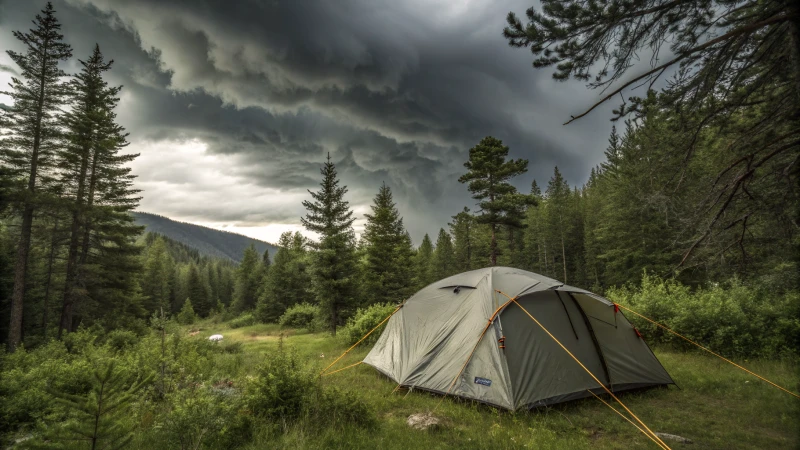
Choose High-Quality Materials
When it comes to tents, I’ve learned that investing in high-quality materials is like buying insurance against nature’s surprises. I always opt for tents with aluminum or galvanized steel frames—they’re sturdy and resist corrosion like a champ. My go-to fabric is PVC-coated polyester because it’s waterproof, UV-resistant, and flame-retardant. Checking for industry certifications like ISO, CE, or SGS gives me peace of mind about their durability.
Regular Inspections
I’ve made it a habit to inspect my tent regularly. It’s kind of like a weekly ritual now. Whether it’s looking for rust on the frames or checking the fabric for wear and tear, these small steps save me from bigger headaches later on. Before and after every use, I do a quick once-over to catch any damage from setup or takedown.
Weather-Specific Protection
Wind
For those windy days, I swear by using solid anchoring systems like stakes, weights, or ground screws. And if a storm is brewing, adding some wind bracing makes all the difference in keeping my tent stable.
Rain
I’ve learned to keep the fabric tension just right to avoid those pesky water pools. Installing drainage systems helps direct water away, ensuring my tent stays dry and cozy inside.
Sun
Sun exposure can be brutal, so I always choose fabrics with UV protection. Adding an extra UV-resistant coating has become my go-to trick to extend my tent’s lifespan.
| Weather Condition | Recommended Action |
|---|---|
| Wind | Use anchoring systems and wind bracing |
| Rain | Ensure fabric tension and install drainage systems |
| Sun | Utilize UV-protected fabrics and apply additional coatings |
Proper Installation and Dismantling
Following the manufacturer’s guidelines for setup and takedown isn’t just advice—it’s essential. I’ve learned the hard way that having enough manpower and the right tools is crucial to prevent damage.
Accessories for Enhanced Protection
Adding flooring is my top tip for protecting the fabric base from sharp objects. And sidewalls? They’re perfect for shielding against wind, rain, or sun. Overhangs or canopies also help reduce exposure to sunlight and rain.
For more insights into protecting your tent against harsh weather, check out resources like industrial tents best practices7 or tent maintenance tips8. These guides have helped me maintain my tent’s integrity no matter what Mother Nature throws my way.
PVC-coated polyester tents are UV-resistant.True
PVC-coated polyester is designed to be UV-resistant, protecting tents from sun damage.
Weekly inspections are unnecessary for tent maintenance.False
Regular inspections help identify issues early, preventing potential damage and extending tent lifespan.
How Does Professional Maintenance Enhance Tent Durability?
Imagine spending a peaceful night under the stars, only to be rudely awakened by a leaking tent. That’s where professional maintenance comes in.
Professional maintenance is essential for enhancing tent durability, ensuring all components are in top-notch condition. Regular inspections and prompt repairs prevent minor issues from escalating, maintaining the tent’s integrity over time.
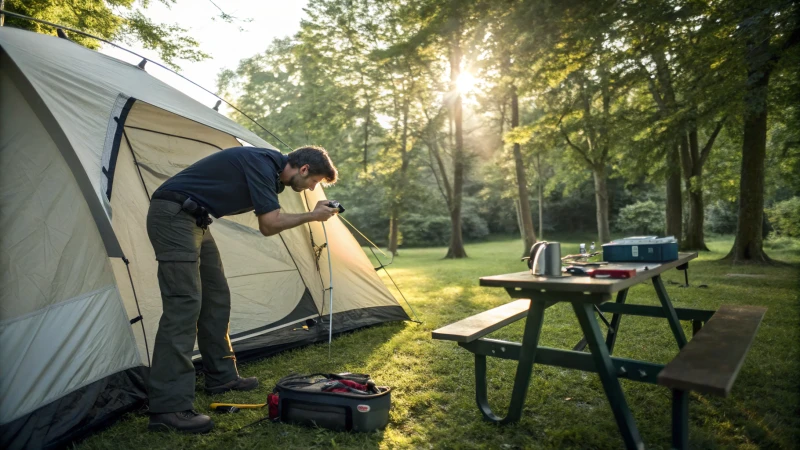
The Value of Regular Inspections
Have you ever had a tent collapse in the middle of a storm? Trust me, it’s not fun. That’s why I swear by regular inspections. Just like you wouldn’t ignore a strange noise in your car, you shouldn’t overlook potential wear and tear on your tent. Professionals are trained to spot fabric abrasions or rusting frames before they become big problems, keeping your tent safe and sound. By maintaining a scheduled inspection routine9, tents remain in optimal condition.
The Importance of Timely Repairs
I once put off fixing a small tear in my tent. Bad idea. A sudden gust of wind turned that little rip into a major problem. Now, I leave repairs to the pros who can quickly patch things up, ensuring everything from fabric tears to loose bolts are dealt with swiftly.
Typical Tent Repairs
| Component | Common Issues | Maintenance Action |
|---|---|---|
| Fabric | Tears, UV damage | Patch or replace |
| Frame | Rust, loose joints | Tighten or replace |
Benefits of Professional Cleaning
After a week-long festival, my tent was a muddy mess. I tried cleaning it myself, but it never looked quite right until I took it to professionals. They use the right cleaning agents to protect the fabric while removing all the grime. It’s amazing how much longer a clean tent lasts.
Enhancing Structural Stability
When I camp in windy areas, I rely on advice from experts about reinforcing my tent with support mechanisms10 like wind braces or snow poles. This extra support has saved me from many sleepless nights worrying about my tent holding up.
Monitoring Environmental Conditions
I’m not always great at predicting the weather, but some professional services use monitoring systems to help out. They track things like humidity and UV exposure, which helps me decide when and where to set up my tent to avoid unnecessary damage.
Professional Maintenance Plans
I used to think maintenance plans were an unnecessary expense until I realized how much time and money they save in the long run. With professionals regularly checking up on my tent, I know it’s always ready for the next adventure without any nasty surprises.
Regular inspections prevent tent structural issues.True
Routine checks catch early wear signs, preventing serious damage.
Professional cleaning can damage tent coatings.False
Experts use approved agents that maintain integrity without harm.
Conclusion
To extend the life of an industrial tent, invest in high-quality materials, conduct regular inspections, protect against weather damage, and ensure proper maintenance and storage practices.
-
Learn why UV protection in fabrics prevents sun damage, extending your tent’s life. ↩
-
Find out how applying anti-rust treatments can preserve metal frames from corrosion. ↩
-
Safety audits prevent accidents and ensure compliance with regulations in construction. ↩
-
Equipment checklists ensure machinery operates safely and efficiently. ↩
-
Certification ensures inspectors meet high standards in aviation safety. ↩
-
Digital tools provide accurate data and streamline inspection processes. ↩
-
Explore this link for detailed best practices in maintaining industrial tents against weather damage. ↩
-
Gain insights on effective maintenance tips for tents in severe weather through this resource. ↩
-
Learn why regular inspections are crucial in maintaining tent longevity and preventing minor issues from becoming major problems. ↩
-
Discover various methods and tools to reinforce your tent against adverse weather, enhancing its overall durability. ↩


